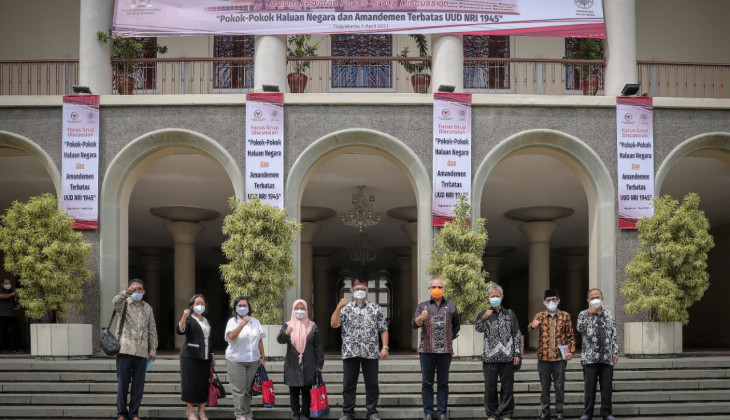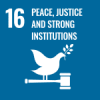 UGM received a visit from the DPD (Regional Leadership Council) Group at the MPR (People’s Consultative Assembly) on Thursday (1/4) at the Multimedia Room, UGM Central Building. The visit was aimed to discuss the main points of state policy and the limited amendments to the 1945 Constitution of the Republic of Indonesia with several UGM experts.
UGM received a visit from the DPD (Regional Leadership Council) Group at the MPR (People’s Consultative Assembly) on Thursday (1/4) at the Multimedia Room, UGM Central Building. The visit was aimed to discuss the main points of state policy and the limited amendments to the 1945 Constitution of the Republic of Indonesia with several UGM experts.
“The discussion this time focused on how the position of the Principal Policy in the State Administration System in Indonesia is. This theme is a continuation of a series of activities carried out by the DPD Group at the MPR as a follow-up to MPR Decree No. Position 2014-2019,” explained the Chairman of the DPD Group at the MPR, Dr. Intsiawati Ayus.
She explained that based on the initial studies carried out by the DPD Group at the MPR, issues of the Main Principles of State Policy are important and relevant to be explored concerning the current dynamics and political directions of development.
“We note that the current implementation of development still has inequality, inconsistency, and desynchronization,” she said.
The DPD group in the MPR is of the view that there is currently a need for a guide or direction that can be used as a reference in carrying out sustainable and directed development. In the preparation process, this should provide space for the regions to determine the direction of the development implementation policies themselves.
Law Number 17 of 2007 concerning Long-Term Development Plans for 2005 – 2025 is considered not to have positioned the regions as they should be following the Constitution. The regions still do not have the space to determine the direction of development policies as needed by the regions.
“Of course we need views and input from various elements, including academics who certainly have the scientific capacity and different theoretical thoughts that can provide constructive input from the various issues and discourses that we have conveyed above,” said Intsiawati.
Professor of the Faculty of Philosophy UGM, Prof. Kaelan, expressed his views regarding the unclear position of the DPD in the constitutional context. The DPD’s authority, according to him, is limited, so that it cannot maximize its role, especially in decision making.
In line with this, Dr. Andy Omara revealed that the Constitution does explicitly determine the limits of the DPD’s authority, which makes it unequal to the DPR.
“There have been efforts to strengthen it again or at least restore it with a judicial review, and it has worked. But according to my understanding, the design of parliament in Indonesia is indeed less than ideal,” he explained.
Andy said strengthening the DPD is one of the important changes to make to the Constitution.
Indonesia consists of regions with their uniqueness that cannot be ignored, especially since the Constitution has declared that Indonesia is a unitary state that adheres to a decentralized system. Thus, regional voices are also a concern.
“In my opinion, it is important to empower the DPD not only on the authority side but also on the quantity side so that it can provide color and strength to monitor and balance each other,” said Andy.


